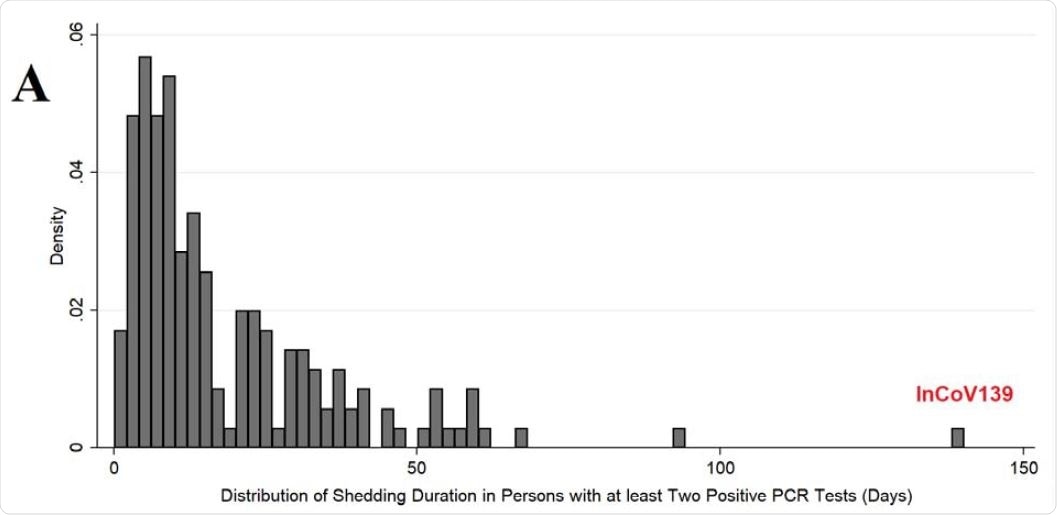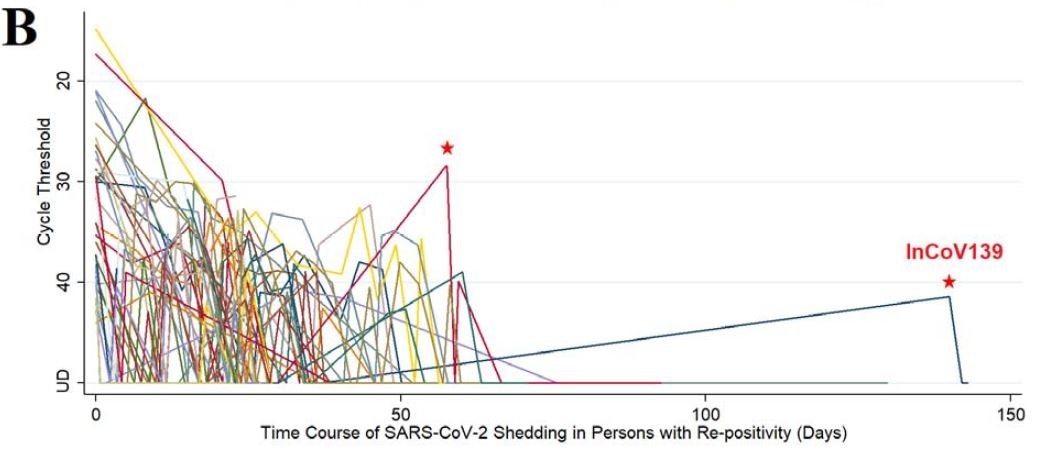Over 33 million people worldwide have been infected with severe acute respiratory syndrome coronavirus 2 (SARS-CoV-2), and over 1 million lives have been lost to COVID-19, the disease caused by the virus. Since the pandemic first emerged last December in Wuhan, China, there have been very few cases of reported re-infections with the virus.
Now, American researchers have looked at all reported cases of re-infection and the possible reasons behind them. Their study titled, “Re-infection with SARS-CoV-2 and Failure of Humoral Immunity: a case report,” is published online on the preprint server medRxiv in September 2020.
Prolonged viral shedding or re-infection?
Studies have shown that in some infected individuals, there may be continued positive reports by way of reverse transcription-polymerase chain reaction (RT-PCR) – a sensitive test for the virus. The researchers explained that even after recovery from the infection, dead viral RNA particles remain, and these continue to be shed from the patient’s nose and respiratory cells. The RT-PCR test picks up these dead virion particles, sometimes weeks after recovery.

Population viral RNA shedding from patients with COVID-19.

 This news article was a review of a preliminary scientific report that had not undergone peer-review at the time of publication. Since its initial publication, the scientific report has now been peer reviewed and accepted for publication in a Scientific Journal. Links to the preliminary and peer-reviewed reports are available in the Sources section at the bottom of this article. View Sources
This news article was a review of a preliminary scientific report that had not undergone peer-review at the time of publication. Since its initial publication, the scientific report has now been peer reviewed and accepted for publication in a Scientific Journal. Links to the preliminary and peer-reviewed reports are available in the Sources section at the bottom of this article. View Sources
The researchers assure, however, that the virus is not likely to be transmissible after 10 days in a person with normal immunity and is not infective after up to 20 days in immunocompromised patients or those with a suppressed immune system.
Studies from Korea for example, have shown that symptomatic patients who tested positive again for SARS-CoV-2 infection after an initial negative test do not transmit the virus to other individuals. The team wrote, “Most case reports do not distinguish between prolonged shedding and re-infection.”

Sequencing of the viral RNA could be the answer
The team explains that to differentiate between the two – false-positive and re-infection, further tests are needed. A false-positive result on testing is where dead viral RNA or remnants of an earlier infection show up on RT PCR. A re-infection is when a person gets a new infection with often a different strain of the novel coronavirus. The team says that the viral RNA needs to be genetically sequenced to be sure that it is a case of re-infection or prolonged viral shedding.
The Hong Kong case and the Nevada case
Two notable cases of re-infection have been reported to date. The Hong Kong case was a re-infection with a different strain of the virus 5 months after the initial infection. The Nevada case was a case of re-infection 2 months fate the primary infection.
Antibodies against SARS CoV-2
Researchers wrote that in most cases of COVID-19, there had been the production of anti-SARS-CoV-2 antibodies. However, the actual immunity or resistance these antibodies produced against the virus is not known.
The antibodies against the virus are Immunoglobulin G (IgG), Immunoglobulin M (IgM), and Immunoglobulin A (IgA), which target the spike protein on the viral surface, or against the receptor-binding domain (RBD) or nucleocapsid (N) antigens.
After the onset of symptoms, it takes around 4 weeks for the IgM and IgA to decline, and IgG also declines in those with mild symptoms or those with an asymptomatic course of the infection. Those who have a severe COVID-19 illness have a persistently high level of IgG.
Convalescent plasma
In those with severe illness, SARS-CoV-2-specific antibodies could help ease the symptoms. These can be obtained from blood plasma of those who have recovered from the infection. The theory suggests that humoral immunity of the body would protect against SARS-CoV-2. This same principle is to be utilized by vaccines as well as in the theory of herd immunity. Due to a lack of research into immunity and re-infections, the role of humoral immunity is not clearly understood.
What was found in this case?
For this study, the team performed a whole viral genome sequencing to define a new re-infection case. They looked at the antibody and B cell analyses and tried to see if the patient mounted an immunity against a new SARS-CoV-2 strain.
The population studied was between March 1st and August 12th, 2020, where a total of 11,622 patients were included who had tested positive on RT PCR. 643 patients had at least one positive test, and 176 patients had at least two positive samples. The average time between first and last positive helped determine the duration of viral shedding. The median shedding duration was 12.1 days. In two patients, the shedding was up to 75 days.
Re-positivity was observed in 43 patients. The causes could be –
- “inadequate sampling technique.”
- “assay limitations with the Ct result hovering at the limit of detection” (Ct indicates viral load in the sample taken)
- “prolonged shedding, potentially combined with either of the former.”
- “re-infection”
The patient with the most prolonged duration between negative rt-PCR and re-positive was of much interest to the researchers. He was code-named InCoV139, and is aged between 60 and 69. He had a history of severe lung disease emphysema and is on home oxygen support. He also suffering from hypertension. He was hospitalized in early March for severe pneumonia due to COVID-19 disease.
Patient InCoV139 returned to the hospital on day 140 of the first positive COVID-19 test with a cough and weakness. This time around he tested positive again, but his illness was less severe. He was administered remdesivir and dexamethasone.
On analysis, they found that the spike variant D614G caused InCoV139’s re-infection. They also noted the antibody and B cell analytics to see a differential response to D614G.
Implications
The team says that once their findings are considered together, they can conclude that id there is a “poorly developed or waned antibodies against the D614 virus” in the primary infection, as seen in this case, there is no protective effect against a repeat infection with a D614G spike variant such as the one this patient acquired in July 2020.
They noted that this could be important for the “success of vaccine programs based on the Wuhan strain.” For patient InCoV139 however, the repeat infection was milder than the primary infection. They called for more extensive case series and studies to study patients with re-infection or follow-up after vaccination to see if the immune system could prevent a re-infection.

 This news article was a review of a preliminary scientific report that had not undergone peer-review at the time of publication. Since its initial publication, the scientific report has now been peer reviewed and accepted for publication in a Scientific Journal. Links to the preliminary and peer-reviewed reports are available in the Sources section at the bottom of this article. View Sources
This news article was a review of a preliminary scientific report that had not undergone peer-review at the time of publication. Since its initial publication, the scientific report has now been peer reviewed and accepted for publication in a Scientific Journal. Links to the preliminary and peer-reviewed reports are available in the Sources section at the bottom of this article. View Sources
Journal references:
- Preliminary scientific report.
Re-infection with SARS-CoV-2 and Failure of Humoral Immunity: a case report. Jason D. Goldman, Kai Wang, Katharina Roltgen, Sandra C. A. Nielsen, Jared C. Roach, Samia N. Naccache, Fan Yang, Oliver F. Wirz, Kathryn E. Yost, Ji-Yeun Lee, Kelly Chun, Terri Wrin, Christos J. Petropoulos, Inyou Lee, Shannon Fallen, Paula M. Manner, Julie A. Wallick, Heather A. Algren, Kim M. Murray, Yapeng Su, Jennifer Hadlock, Joshua Jeharajah, William R. Berrington, George P. Pappas, Sonam T. Nyatsatsang, Alexander L. Greninger, Ansuman T. Satpathy, John S Pauk, Scott D. Boyd, James R. Heath medRxiv 2020.09.22.20192443; doi: https://doi.org/10.1101/2020.09.22.20192443
- Peer reviewed and published scientific report.
Goldman, Jason D., Kai Wang, Katharina Röltgen, Sandra C. A. Nielsen, Jared C. Roach, Samia N. Naccache, Fan Yang, et al. 2023. “Reinfection with SARS-CoV-2 and Waning Humoral Immunity: A Case Report.” Vaccines 11 (1): 5. https://doi.org/10.3390/vaccines11010005. https://www.mdpi.com/2076-393X/11/1/5.